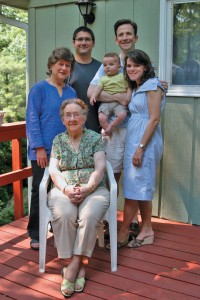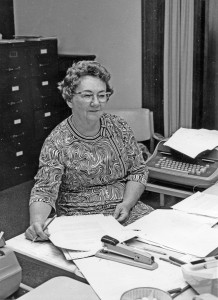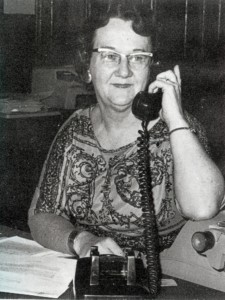When Eileen Sandberg Loya ’40 died peacefully in her sleep on Feb. 5, five months shy of her 100th birthday, she took with her an encyclopedic memory of Monmouth College’s institutional history, gleaned from having faithfully and expertly served as assistant to five presidents.
She also graced the campus community with her more than seven decades of service as a faculty spouse, active alumna and mother of three Monmouth graduates.
Mrs. Loya was without a doubt one of the most remarkable people I had the pleasure of knowing; as Monmouth College legends go, I put her on a par with the likes of Gracie Peterson, Sam Thompson and Bobby Woll.
Following the death in 1989 of her beloved husband, longtime music professor Heimo “Hal” Loya, Eileen continued to live in the comfortable retirement home the couple had built in the Brewery Hill subdivision of Monmouth. It was only recently that her increasing difficulty in walking forced her into a nursing home. Never one to dwell on misfortune, she accepted the change as gracefully one could, and always had a pleasant word for old friends when they were visiting the facility. Until suffering a recent stroke, she remained sharp as a tack, had a healthy appetite and a maintained her trademark sunny disposition.
While Mrs. Loya’s pride in her alma mater was boundless, her greatest pride was in her family. Her eldest son, Mervyn ’62, is a retired director of career services at the University of Oregon School of Law. Daughter Karin ’63 recently retired as program manager for the science and support division of a major defense company. Son Alan ’66, now retired, taught sociology for several years before putting his experience to practical use as a probation/parole officer for the state of Missouri. In recent years, her grandchildren have also brought her great joy—most recently Merv’s son Kari, an Emmy-winning voice-over artist, who published an inspirational book in conjunction with his 40th birthday.

I snapped this photo of Eileen with her daughter, Karin, grandchildren and great-grandson at her home in the summer of 2007, just before her 94th birthday.
As I mentioned, Mrs. Loya was a living repository of Monmouth College history—having personally lived much of that history—and she loved to tell its tales, such as the time in the president’s office when she took an unexpected phone call from an attorney seeking a suitable recipient for a $1 million gift, which ultimately became the naming gift for Hewes Library.
She could be a dogged historian. In the summer of 1979, President DeBow Freed asked Mrs. Loya to prepare a form nominating Quinby House for a listing in the National Register of Historic Places. For the next nine months, the project consumed her and resulted in a very thorough 59-page book, which today resides in the archives and was instrumental in the designation being awarded.
Even professional historians came to rely on Mrs. Loya’s experience. Professor Bill Urban regularly sought her out when researching his histories of Monmouth College:
“I will miss my talks with Eileen. At 99 she was sharper than many people half her age, and her conversation livelier. In recent years she did tend to talk more about her family, which was to be expected—not only were her children and their offspring everything any mother could wish, but her contacts with the college and the community were less close. But she was never dull.
“She was active at the college in years when powerful women were common (Jean Liedman and Dorothy Donald come to mind) or were inspiring teachers (Gracie Peterson and Mary Crow), but as presidential secretary she was quietly the most important. Presidents relied upon her, and faculty listened when she spoke; she was accurate, efficient and polite.
“Today she would be a college president, but times were different then. She gave up a good job as an executive secretary in Chicago to follow her husband to Monmouth and then to raise their children. It was a sacrifice she willingly made. Not a bad choice, either, she would have said. A meaningful life must have priorities.”
Mrs. Loya often had a good story. I recall her telling about when Tom and Martha Hamilton, who ran the Fine Arts department, moved out of their small apartment on second floor of the Fine Arts (now Admissions) building and she and Hal moved in with their baby, which was soon to be followed by a second child. Small apartment is an understatement. The entire space was about the size of one of today’s dorm rooms! One Sunday, the Hamiltons, who had moved across the street, invited the Loyas over for breakfast. According to Mrs. Loya, Martha had many talents, but cooking wasn’t one of them. That morning, she came to the table crying, “Oh, Tommy, I burned the toast!” Tom proceeded to select two of the blackest pieces and said, “Oh well, carbon is good for us!”
Given her penchant for organizing and preserving, I was not surprised when in 2005 Mrs. Loya published her own modest memoir, titled “One Grandmother’s Journey.” It is a wonderful volume that sheds fascinating light on her Finnish roots, her strong work ethic, her love of church and family, and—my favorite part—stories of Monmouth College.

Mrs. Loya was serving as administrative assistant to President Wimpress when this photo was taken, circa 1969.
In the memoir, Mrs. Loya recounts how she worked her way up from a part-time secretary to assistant to the president. One night in 1954, then-business manager Dick Petrie and his wife called the Loyas at 10 p.m. to go out for hamburgers, where they announced Dick was leaving to become a vice president at Willamette University. That left President Gibson with the difficult task of replacing his valuable business manager. Mrs. Loya, who had been working as Petrie’s secretary, was sent with college bookkeeper Dorothy Whaling to the University of Omaha for part of a summer to strengthen their business skills.
An alumnus named Carroll Scouller was hired as the business manager, but the job soon became too much for him and he decided to leave, so President Gibson asked Mrs. Loya to take over the position until a new replacement could be found. She began attending monthly trustee meetings and proved so knowledgeable that the trustees offered her the position of permanent business manager, which she declined because of family responsibilities.
When new business manager Harlan Cain (whom Mrs. Loya had met in Omaha and recommended for the position) came aboard, he told her that President Gibson had requested that she become secretary to the president, a position that would eventually be elevated to presidential assistant. Mrs. Loya recalls a meeting of the College Senate that was delayed because its secretary was late. She was asked to pinch hit and did such a good job taking the minutes that it was not long before she also became corporate secretary and secretary of the Senate.
Mrs. Loya’s service to Monmouth College spanned the administrations of James Harper Grier, Robert Gibson, Duncan Wimpress, Richard Stine and DeBow Freed. Her interest in the college continued until her death. She watched Monmouth grow from a struggling school in the midst of the Depression to the thriving, mature institution it is today, and she was a part of that growth.
When the college presented her with the Distinguished Service Award in 1976, Mrs. Loya’s longtime associate David Fleming summed up her contributions by noting, “Her skillful touch could be found in everything from making travel arrangements to coordinating social events to aiding in the development of the agenda for meetings of the College Senate. No matter how important or how mundane the task at hand, Mrs. Loya’s criterion for its accomplishment was simply this: Nothing less than perfection is acceptable.”
In my mind, having had Eileen Loya as a friend was nothing less than perfection.

